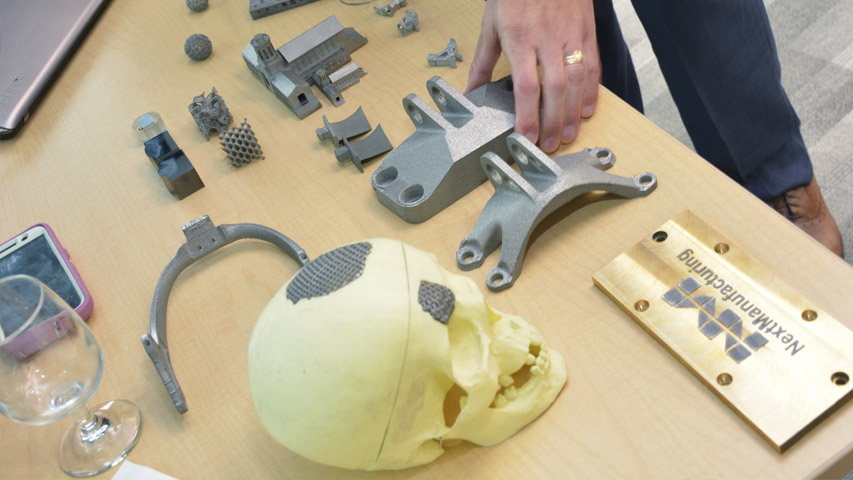Consortium Aims To Unlock 3-D Printing Potential
General Electric Among Key Players in Center's Research, Training
By Hannah Diorio-Toth

From airplane parts to custom hip replacements, 3-D printing — also known as additive manufacturing — is changing how everything can be constructed.
Carnegie Mellon University's NextManufacturing Center has created a consortium to bring together major companies and organizations in industry, the nonprofit sector and government to help unlock the huge potential of additive manufacturing in the United States. The center announced the consortium at a July 22 launch event on campus.
"Additive manufacturing is here now, and it's here to stay," said Jack Beuth, director of the NextManufacturing Center and professor of mechanical engineering. "One of the most important steps in making real progress with this technology is to bring all the key players — academia, industry, government, nonprofits — together to share knowledge, ideas and challenges. It's an integral part of creating a thriving additive manufacturing ecosystem, and today, we get do that here at Carnegie Mellon."
For businesses, additive manufacturing has many benefits including on-demand capabilities, product customization (both aesthetically and mechanically) and producing less waste than traditional manufacturing processes. Through collaborations, the consortium aims to increase the widespread adoption of additive manufacturing technology.
"With Carnegie Mellon's deep history in additive manufacturing research and the innovative ideas of our faculty and students, the NextManufacturing Center is extremely well poised to tackle the challenges of this advancing technology," said College of Engineering Dean James H. Garrett. "This new consortium is an important opportunity to bring leading industry, government and nonprofit insight into the center's research goals."
As one of the world's leading research centers for additive manufacturing, the NextManufacturing Center, which includes faculty and students from the College of Engineering, School of Computer Science and Mellon College of Science, is committed to developing new ways of thinking to make 3-D printing a mainstream manufacturing process. The center also is developing new tools for a wide range of complex manufacturing processes.
The NextManufacturing Center Consortium's 11 founding members are leading corporations and organizations interested in optimizing the design, materials and processes of additive manufacturing for applications in industries, such as the aerospace and automotive industries.
General Electric Company (GE), an industrial additive manufacturing leader, joins the consortium as the founding premium member. GE will take a unique role in the center's research and receive specialized additive manufacturing training in the center.
"GE is proud to continue our collaboration with Carnegie Mellon University, which we already partner with on a robotics accelerator, and with Pittsburgh, where we just opened a Center for Additive Technology Advancement in April," said Edward D. Herderick, GE's Additive Technologies Leader.
"In order to be competitive globally, we need to strengthen the skills of the workforce and propel the industry forward. This consortium, made up of strong advocates and partners that believe in additive manufacturing, is an important step in maturing advanced manufacturing technologies and processes, so we can precisely and cost-effectively accelerate the speed of industrial innovation," Herderick said.
The consortium partnerships will provide new opportunities for NextManufacturing Center researchers to consider design, research fundamental elements of processes and materials, evaluate new tools and methods, develop critical knowledge and experience and train the next generation of professionals.
"Collaborating across disciplines and with outside companies has been a huge reason that we have been able to deliver such impactful results here in the NextManufacturing Center," said Anthony Rollett, professor of materials science and engineering and NextManufacturing associate director. "We are very excited that the NextManufacturing Center Consortium is creating more valuable partnerships for Carnegie Mellon's additive manufacturing researchers. These collaborations will not only ensure that our research directly targets real-world problems, but that real-world problems directly influence our research."
NextManufacturing Center Consortium founding members: